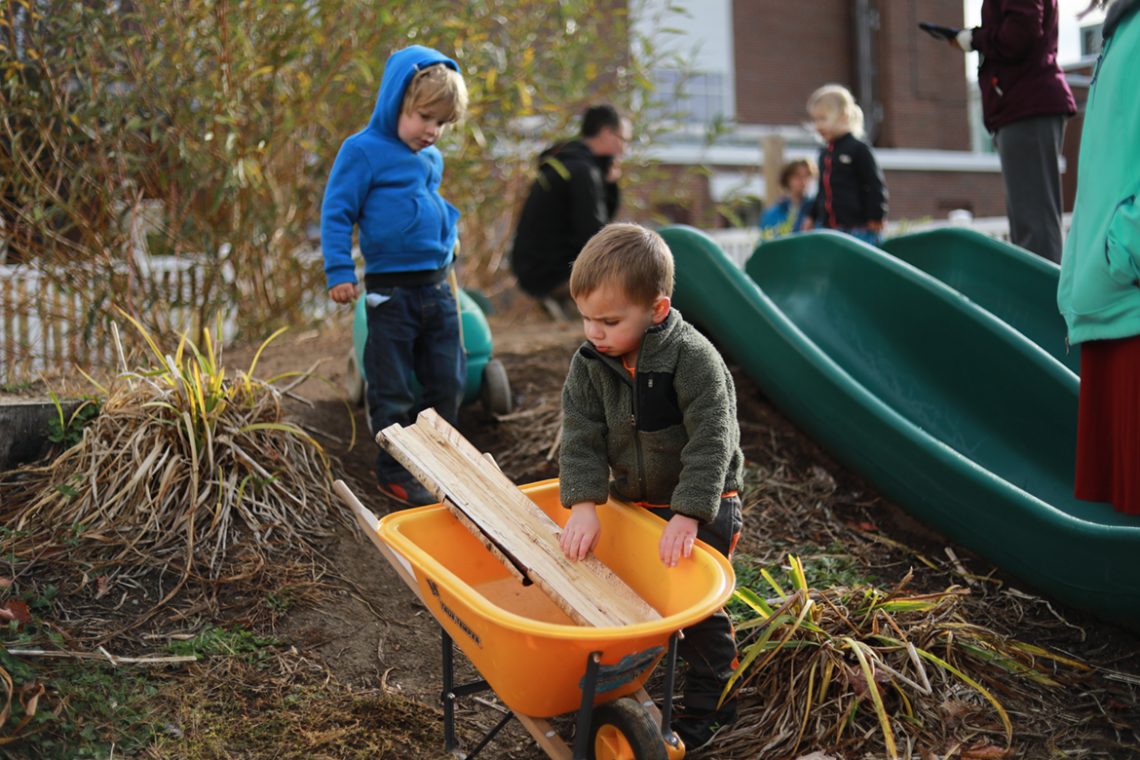Ten students begin their UMF adventure by making play more adventurous for children at the University’s Sweatt-Winter Early Care and Education Center.
Story: Marc Glass / Photos: Ryan Mastrangelo / December 2019
The transition to college is a period of intense change, with new freedoms, peers, academic expectations, living arrangements, and social norms to navigate. As messy, thrilling, and anxiety-provoking as all the upheaval can be, perhaps it’s a fruitful time for young people to study those who thrive on change.
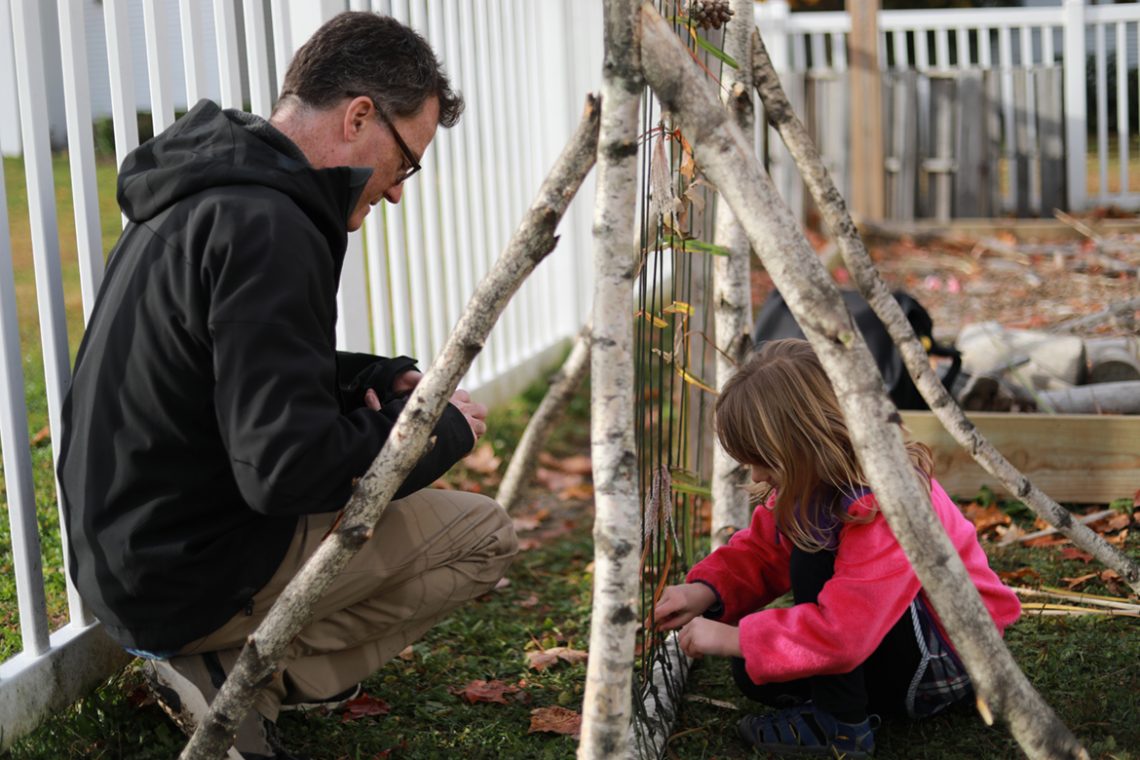
Matt McCourt, associate professor of geography, watches a Sweatt-Winter Early Care and Education Center student engage the weaving loom that his students designed and installed at the center’s outdoor playscape as part of the First-Year Fusion Course Making Change in Maine.
So thinks Matt McCourt, associate professor of geography, who developed the innovative First-Year Fusion course Making Change in Maine with colleague Jesse Minor as a way for incoming new UMF students to mix off-campus experiential learning with an impactful, community-enhancing project. Supported by the historic Catalyst Fund gift to the University, McCourt, Minor, and their students began the course in the last week of August, prior to the start of the traditional semester, with a week of travel throughout Maine.
Their many destinations involved meeting with, observing, and interviewing people McCourt deems local “change-makers.”
“We learned about how these people are revitalizing their communities through locally produced foods, fishing, and the arts,” says McCourt. “Or by using cutting-edge technology and natural history experiences to enhance children’s learning — or even offering a wide range of public safety, recreation, disability services, and other essential programs for Mainers.”
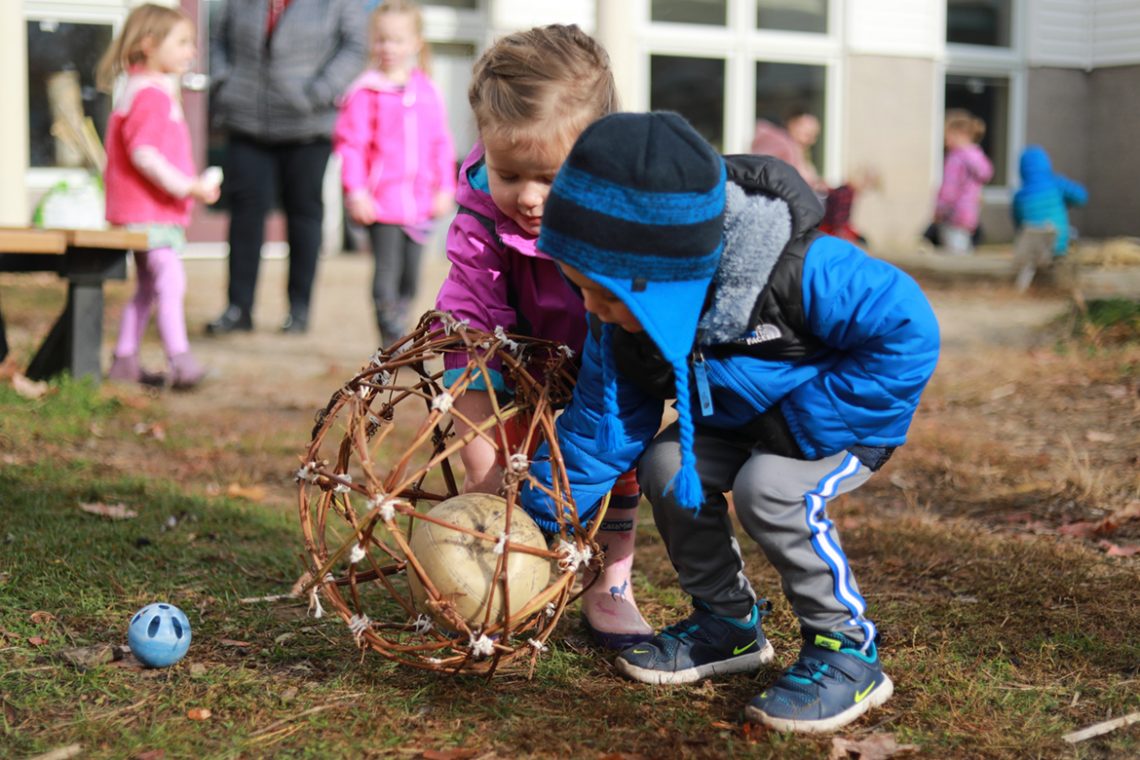
Designed by McCourt’s students, this “grapevine ball” is especially engaging for children because “it can be grasped and manipulated by little hands,” he says.
McCourt’s students returned to UMF brimming with ideas and inspiration regarding how they could make change for the region’s youngest and most impressionable learners.
“When we came back to campus we embarked on our own ways of making change by studying nature-based playscapes and designing ingredients for the Sweatt-Winter Early Care and Education Center,” explains McCourt.
To start, his students investigated how people interact and engage in public spaces, as well as new ways of encouraging children to connect with nature. Students recollected and mapped their own childhood playscapes, and closely studied children’s play at Sweatt-Winter. Then they teamed up with a class taught by Patti Bailie, assistant professor of early childhood education, focused on planning environments for young children. The two classes investigated Swiss forest kindergartens and collaborated on a design activity led by Laura Newman, a Maine playscape designer.
“We learned about how play areas have been changing to provide children more agency in how they play,” says McCourt. “Instead of a play structure, designed to be used in a single way, we designed play ingredients that could be engaged in many different ways and stimulate a range of learning.”
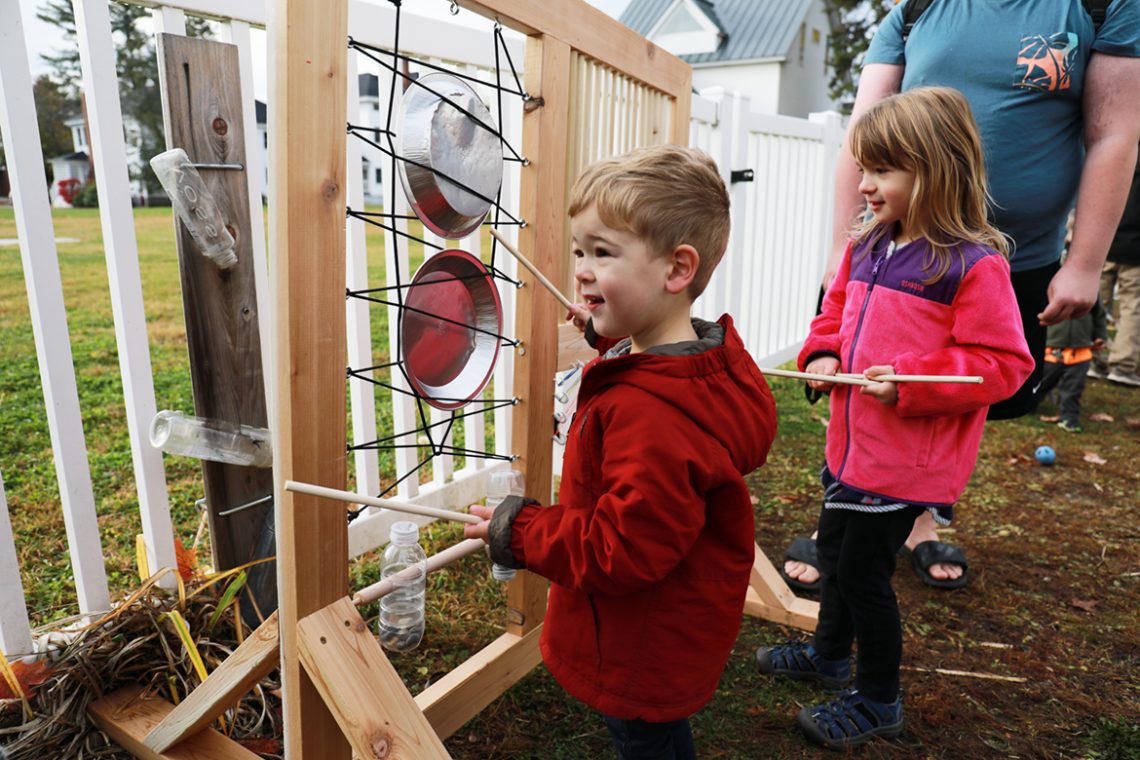
Julie Farmer ’89, director of children’s programs at Sweatt-Winter, says the music wall designed and constructed by McCourt’s students encourages developmentally appropriate gross-motor play.
McCourt and his students delivered their proposals to members of the Sweatt-Winter staff, who chose five designs for implementation.
Julie Farmer ’89, director of children’s programs at Sweatt-Winter, says she was “awed” by the students’ investment of interest and research, as well as the offer of installation.
“I was struck by the fact that students who are not in the field of education and who might be new to the concept of natural playscapes would become so enamored with designing, creating, and implementing these natural materials for us,” says Farmer. “It was wonderful that many of them stepped out of their comfort zone to provide the children with new opportunities for play.”
McCourt’s students then created the playscape ingredients in the UMF sculpture lab and shared them with Sweatt-Winter’s little learners on the last class meeting of Making Change in Maine in October.
Among the deliverables was a weaving loom that children can use to fashion together branches, grasses, pine cones, and other found natural objects. The first-year UMF students also built a music wall with percussive instruments such as dowels and metal pie pans.
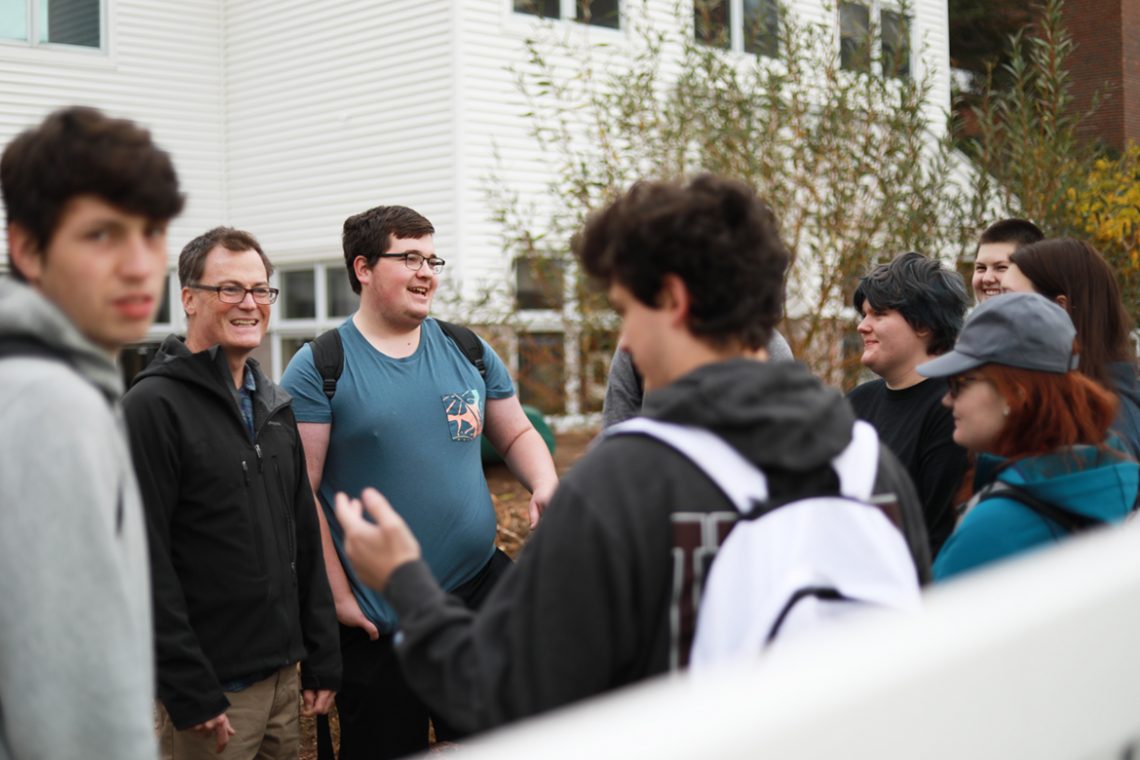
McCourt (second from left) and his Making Change in Maine students find satisfaction in seeing Sweatt-Winter students joyfully engaging the playscape ingredients they designed and built.
“One child called his friend over and said, ‘Do you want to be a rock star with me?’” recalls McCourt. “The children gathered in groups around the music wall and struck it in different ways for different kinds of sensory feedback.”
A set of hollowed-out half logs was also a big hit with Sweatt-Winter kids.
“Some arranged the logs to create a system of connecting channels to move water or balls downhill,” says McCourt. “Others worked in groups to solve problems, rearranging the canal to adjust the movement of water or balls. Some of them jumped and shouted with joy when a ball made it all the way through the canals of the half logs.”
And the “grapevine ball” provided Sweatt-Winter students with no end of fun because “it can be grasped and manipulated by little hands,” says McCourt. “It also has gaps that can fit other playscape ingredients, like smaller balls, allowing for the use of a wide range of motor skills. It was wonderful to see the children working together, playing pass and toss, and stuffing large and small items inside the grapevine ball.”
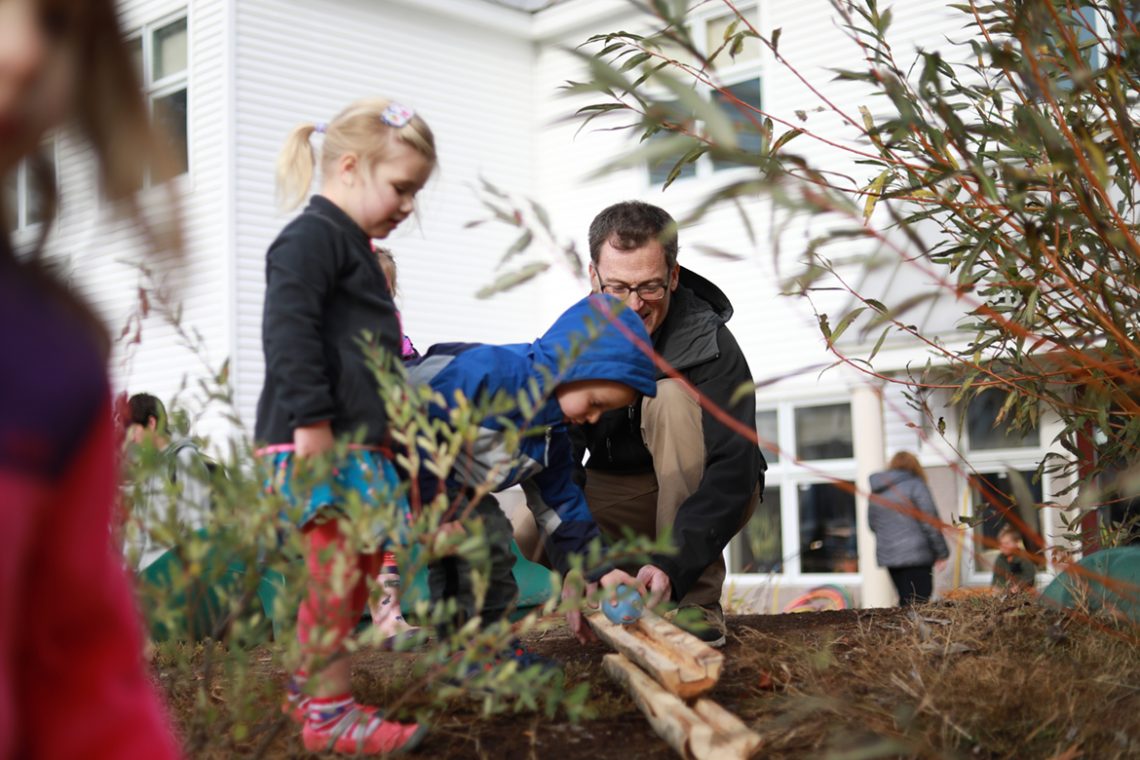
McCourt helps two little learners at Sweatt-Winter use the log trough designed and constructed by students in the First-Year Fusion course Making Change in Maine.
Farmer says the success of the designs is evident in the children’s delight with and sustained use of the play features. What’s more, the nature of the children’s observed play reinforces goals for cognitive, emotional, and physical development: The music wall encourages gross-motor play, the weaving loom sparks problem-solving, and the log troughs creates opportunities for teamwork.
“The materials that Matt’s students provided for our playscape were well thought out, which was evident in the way the children interacted with them. They were drawn to them immediately, and sustained their play with them for an extended time,” says Farmer. “He did a wonderful job guiding his students towards age-appropriate elements that allowed for collaboration and cooperation among the children.”
Farmer says the windfall of intellectual and creative capital McCourt and his students brought to Sweatt-Winter “renews your faith in humanity.”
“Though UMF is known for this type of generosity, I am deeply thankful for what they have done for us — and that we are a part of such a giving community.”
